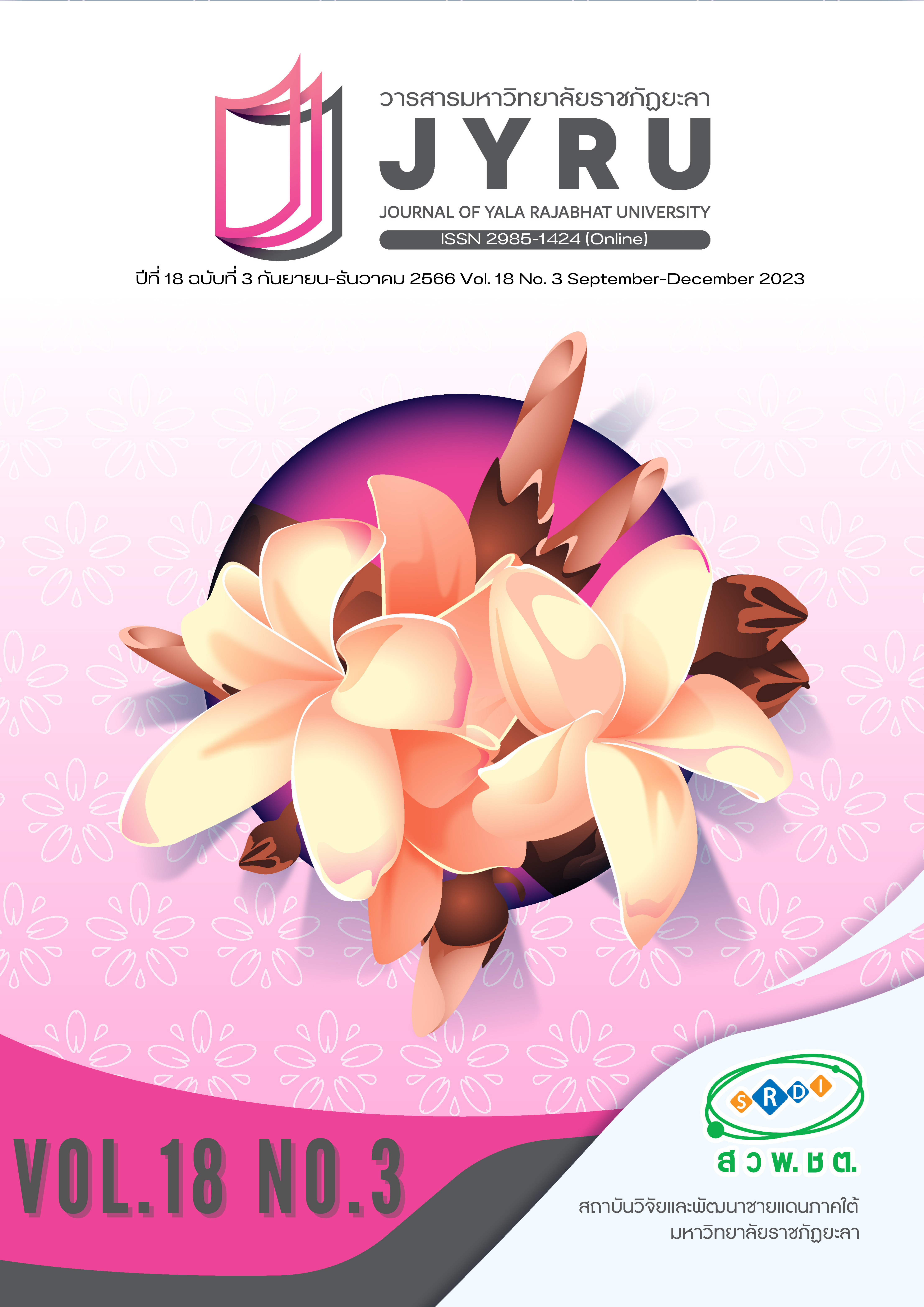แนวทางการจัดการเรียนรู้ตามรูปแบบวัฏจักรการสืบเสาะความรู้ร่วมกับการประยุกต์ใช้เทคนิค STAD ผสมสื่อ GeoGebra ที่ส่งเสริมมโนทัศน์ทางคณิตศาสตร์
Main Article Content
บทคัดย่อ
การเรียนการสอนคณิตศาสตร์พบว่า นักเรียนมีมโนทัศน์ที่คลาดเคลื่อนทางคณิตศาสตร์ส่งผลต่อการเรียนคณิตศาสตร์ในระดับชั้นต่อไปจึงทำการวิจัยแนวทางการจัดการเรียนรู้ตามรูปแบบวัฏจักรการสืบเสาะความรู้ร่วมกับการประยุกต์ใช้เทคนิค STAD ผสมสื่อ GeoGebra ที่ส่งเสริมมโนทัศน์ทางคณิตศาสตร์ การวิจัยนี้มีวัตถุประสงค์เพื่อ 1) ศึกษาแนวทางการจัดการเรียนรู้ตามรูปแบบวัฏจักรการสืบเสาะความรู้ร่วมกับการประยุกต์ใช้เทคนิค STAD ผสมสื่อ GeoGebra ที่ส่งเสริมมโนทัศน์ทางคณิตศาสตร์ เรื่อง การแยกตัวประกอบพหุนามดีกรีสอง 2) เปรียบเทียบมโนทัศน์ทางคณิตศาสตร์ เรื่อง การแยกตัวประกอบพหุนามดีกรีสอง ก่อนและหลังการจัดการเรียนรู้ กลุ่มเป้าหมาย ได้แก่ นักเรียนชั้นมัธยมศึกษาปีที่ 2 โรงเรียนเขาแก้ววิทยาสรรพ์ จำนวน 33 คน โดยการเลือกแบบเจาะจง เครื่องมือที่ใช้ในการวิจัย คือ แผนการจัดการเรียนรู้และแบบวัดมโนทัศน์ทางคณิตศาสตร์ วิเคราะห์ข้อมูลโดยใช้การวิเคราะห์เชิงเนื้อหาและการทดสอบวิลคอกซัน ผลการวิจัยพบว่า การจัดการเรียนรู้ประกอบด้วย 5 ขั้น ดังนี้ 1) สร้างความสนใจ 2) สำรวจและค้นหา 3) อธิบายและลงข้อสรุป 4) ขยายความรู้ 5) ประเมินผล และหลังการจัดการเรียนรู้มีคะแนนมโนทัศน์ทางคณิตศาสตร์สูงขึ้น อย่างมีนัยสำคัญทางสถิติที่ระดับ .05 อธิบายได้ว่าการจัดการเรียนรู้ตามรูปแบบวัฏจักรการสืบเสาะความรู้ร่วมกับการประยุกต์ใช้เทคนิค STAD ผสมสื่อ GeoGebra สามารถพัฒนามโนทัศน์ทางคณิตศาสตร์ของนักเรียนได้ ผลการวิจัยจะเป็นแนวทางในการจัดการเรียนรู้คณิตศาสตร์เพื่อพัฒนานักเรียนในด้านต่าง ๆ ได้แก่ การใช้เทคโนโลยี การแก้ปัญหา และการพิสูจน์ทางเรขาคณิต
Article Details

อนุญาตภายใต้เงื่อนไข Creative Commons Attribution-NonCommercial-NoDerivatives 4.0 International License.
บทความ ข้อมูล เนื้อหา รูปภาพ ฯลฯ ที่ได้รับการเผยแพร่ในวารสารมหาวิทยาลัยราชภัฏยะลานี้ ถือเป็นลิขสิทธิ์ของวารสารมหาวิทยาลัยราชภัฏยะลา หากบุคคลหรือหน่วยงานใดต้องการนำทั้งหมดหรือส่วนหนึ่งส่วนใดไปเผยแพร่ต่อหรือกระทำการใดๆ จะต้องได้รับอนุญาตเป็นลายลักษณ์อักษรจากวารสารมหาวิทยาลัยราชภัฏยะลาก่อนเท่านั้น
เอกสารอ้างอิง
Choi, S. (2010). Motivating students in learning mathematics with GeoGebra. Annals Computer Science Series, 8(2), 65-76.
Inpinit, J. (2016). The development of mathematical conceptual understanding by PBL with STEM education. Master’s Thesis. Ubon Ratchathani University. (in Thai)
Johnson, D. W. & Johnson, R. T. (1994). Learning together and alone: cooperative. New York: Prentice Hall.
Johnson, L. B. (2017). Developing mathematics knowledge. Child Development Perspectives, 11(3), 184-190.
Khaled, H. K. (2014). Conceptual and procedural knowledge of rational numbers for Riyadh elementary school teachers. Journal of Education and Human development, 3(4), 181-197.
Khammanee, T. (2017). Pedagogy: knowledge for effective learning process management (20nd Ed.). Bangkok: Chulalongkorn University Press. (in Thai)
Khammanee, T. (2018). Pedagogy: knowledge for effective learning process management (21nd Ed.). Bangkok: Chulalongkorn University Press. (in Thai)
Khansai, T. (2020). Using GeoGebra program to supplement learning activities through constructivism to develop mathematics achievement on Parabola for Matthayomsuksa 3 students. Journal of Teacher Professional Development, 1(2), 89-96. (in Thai)
Markanong, A. (2014). Mathematics for high school teachers (2nd Ed.). Bangkok: Faculty of Education Chulalongkorn University. (in Thai)
Ministry of Education. (2017). Indicators and learning content of Mathematics (revised edition 2017) (1nd ed.). Bangkok: Printing Cooperative of Thailand. (in Thai)
National Institute of Educational Testing Service. (2021). Basic statistics of O-NET test results, Mattayom 3, academic year 2018-2021 [Online]. Retrieved October 1, 2022, from: https://www.niets.or.th/th/content/view/11821. (in Thai)
Promtrud, A. (2022). Development of conceptual understanding in mathematics of 7th grade students using open approach: classroom action research. CMU Journal of Education, 6(2), 61-75. (in Thai)
Rerai, T. & Kamrat, N. (2021). The Effects of cooperative learning by STAD technique with GeoGebra mathematics on conic section of Matthayomsuksa 4 Students. Social Sciences Research and Academic Journal, 17(3), 171-184. (in Thai)
Sutthirat, C. (2016). 80 Learning management innovations that focus on students (7nd Ed.). Nonthaburi: P Balans Design and Printing. (in Thai)
The Institute for the Promotion of Teaching Science and Technology. (2021). PISA 2018 assessment results reading, mathematics and science (1nd Ed.). Bangkok: The Institute for the Promotion of Teaching Science and Technology. (in Thai)
Thonaboon, J. (2017). The inquiry cycle learning method (5Es) in the 21st century. Lampang: Suan Dusit University Lampang Campus. (in Thai)
Wongyai, J., Jenjit, A., & Nualpang, K. (2016). The effect of organizing the inquiry cycle instructional model (5Es) together with student teams achievement division developing mathematical connection skill in variation for Mathayomsuksa II students. Journal of Education Naresuan University, 18(2), 152-160. (in Thai)
Yommana, K. & Chaipichit, D. (2022). Development of mathematics abilities of primary school student grade 4 by using the open approach and cooperative learning STAD techniques. Journal of MCU Ubon Review, 7(2), 1295-1304. (in Thai)


